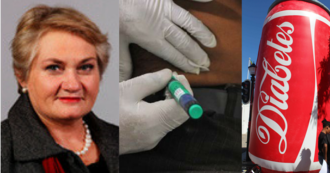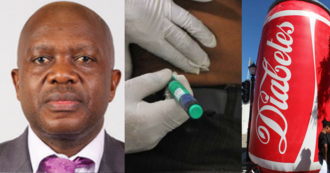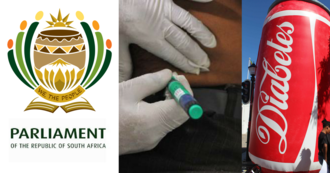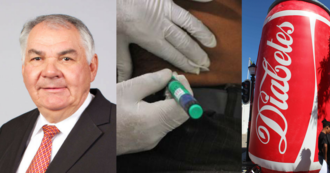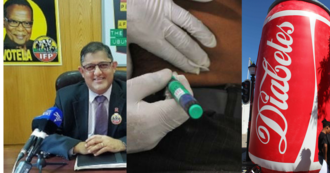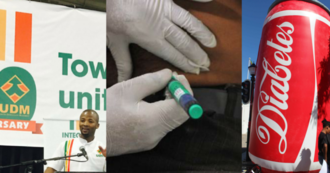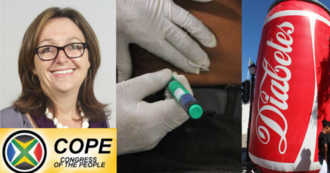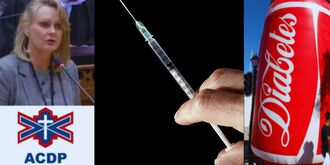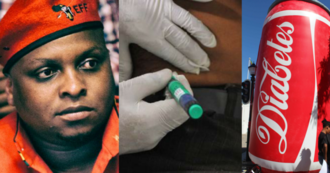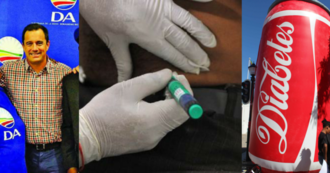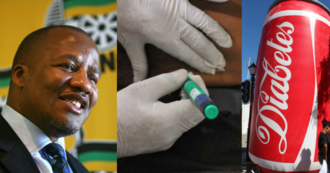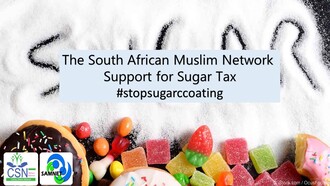- Featured
- Clean air
- Climate justice
- Consumer Rights
- Corporate Accountability
- Data access
- Early Childhood Development
- Economic fairness
- Education
- Electoral fairness
- Environmental justice
- Food justice
- Gender based violence
- Grants/social assistance
- Health
- Housing and infrastructure
- Industry interference
- Land Justice
- LGBTQIA+ rights
- Media/ information access
- Public transport
- Racism
- Reparations
- Safety
- Sanitation
- Service Delivery
- Sexual and Reproductive Rights
- Social justice
- Unemployment
- Womxn's rights/ gender equality
- Workers' rights
- More
-
DA MPs in the National Council of Provinces, vote yes to pass the Health Promotion LevyDiabetes is the leading cause of death for South African women [2], yet the beverage industry is desperately trying to delay and further water down the sugary drinks tax (Health Promotion Levy). BevSA and Coca-Cola’s job losses scaremongering has been exposed as exaggerated [1] and self serving [3]. A recent study showed that 3/4s of adult South Africans believe that government is doing the right thing when it makes and enforces policy to discourage the consumption of sugary beverages and junk foods [4]. We can’t underestimate how far the likes of Coca-Cola will go to protect their profits at the expense of our health. Leaked Coca-Cola executive emails show that the company has managed to get a “seat at the table in on-going regulatory discussions with the Ministry of Health” and has been fighting the tax [5]. BevSA and Coca-Cola also managed to keep health experts and advocates out of the NEDLAC process. Treasury seems to be standing up against companies like Coca-Cola and announced that the sugary drinks tax is likely to be introduced in April 2018. Treasury Deputy Director General Ismail Momoniat went one step further, acknowledging the criticism from the health sector regarding the watering down of the sugary drinks tax, stating that they would “... increase the tax until we get the result we need” [6]. [2] Diabetes - the silent killer. Amy Green for Health-e News August 15, 2017 [3] SA’s proposed sugar tax: claims about calories & job losses checked. Kate Wilkinson & Vinayak Bhardwaj for Africa Check August 2016 [4] 70% of South Africans support sugar tax - Genesis study August 31, 2017 http://www.genesis-analytics.com/news/2017/70-of-sa-suppports-sugar-tax-genesis-study [5] New #CokeLeak: Soda Tax Opposition in 8 More Countries. https://medium.com/cokeleak/new-cokeleak-soda-tax-opposition-in-8-more-countries-a53e2df3d8e4 [6] Sugary drinks tax set for April next year. Kerry Cullinan for Health-E News September 201783 of 100 SignaturesCreated by amandla mobi member

-
ANC MPs in the National Council of Provinces, don't let BevSA poison our peopleOn Tuesday, the National Assembly passed the Sugary Drinks Tax (Health Promotion Levy). The beverage industry was so worried that they threatened the Chairperson of the Standing Committee on Finance the night before the vote [1]. But our voices beat Coke and the rest of the beverage industry. The beverage industry has done everything in its power to stop the Sugary Drinks Tax, and their dirty tactics have been exposed [1]. Not only did the industry fund dubious research to fuel its scaremongering about jobs losses claim, it forced the Sugary Drinks Tax to be discussed at Nedlac, a forum which excluded those affected by type 2 diabetes and other non-communicable diseases fueled by sugary drinks. The beverage industry successfully watered down the Sugary Drinks Tax, but despite a huge campaign, the majority of our MPs in the National Assembly voted to pass the Tax. Now BevSA and Tiger Brands are desperately trying to further erode our democracy by trying to convince the National Council of Provinces (NCOP) that the Sugary Drinks Tax should be scrapped. It is deeply disappointing that the Select Committee on Finance Chair, Charel de Beer, is giving BevSA a platform, and excluding health experts and health groups. [1] Politicians aid industry in dirty war over sugar tax. Kerry Cullinan for Health-e News.117 of 200 SignaturesCreated by amandla mobi member

-
Don't let de Beer give BevSA a platform to undermine the sugary drinks taxOn Tuesday, the National Assembly passed the Sugary Drinks Tax (Health Promotion Levy). The beverage industry was so worried that they threatened the Chairperson of the Standing Committee on Finance the night before the vote [1]. But our voices beat Coke and the rest of the beverage industry. The beverage industry has done everything in its power to stop the Sugary Drinks Tax, and they have had the upper hand. Not only did the industry fund dubious research to fuel its scaremongering about jobs losses claim, it forced the Sugary Drinks Tax to be discussed at Nedlac, a forum which excluded those affected by type 2 diabetes and other non-communicable diseases fueled by sugary drinks. The beverage industry successfully watered down the Sugary Drinks Tax, but despite a huge campaign, the majority of our MPs in the National Assembly voted to pass the Tax. Now BevSA and Tiger Brands are desperately trying to further erode our democracy by trying to convince the National Council of Provinces (NCOP) that the Sugary Drinks Tax should be scrapped. It is deeply disappointing that the Select Committee on Finance Chair, Charel de Beer, is giving BevSA a platform, and excluding health experts and health groups.74 of 100 SignaturesCreated by amandla mobi member

-
Stop BevSA from undermining our democracyOn Tuesday, the National Assembly passed the Sugary Drinks Tax (Health Promotion Levy). The beverage industry was so worried that they threatened the Chairperson of the Standing Committee on Finance the night before the vote [1]. But our voices beat Coke and the rest of the beverage industry. The beverage industry has done everything in its power to stop the Sugary Drinks Tax, and they have had the upper hand. Not only did the industry fund dubious research to fuel its scaremongering about jobs losses claim, it forced the Sugary Drinks Tax to be discussed at Nedlac, a forum which excluded those affected by type 2 diabetes and other non-communicable diseases fueled by sugary drinks. The beverage industry successfully watered down the Sugary Drinks Tax, but despite a huge campaign, the majority of our MPs in the National Assembly voted to pass the Tax. Now BevSA and Tiger Brands are desperately trying to further erode our democracy by trying to convince the National Council of Provinces (NCOP) that the Sugary Drinks Tax should be scrapped. It is deeply disappointing that the Select Committee on Finance Chair, Charel de Beer, is giving BevSA a platform, and excluding health experts and health groups.177 of 200 SignaturesCreated by amandla mobi member

-
IFP vote Yes in the National Assembly For The Health Promotion LevyDiabetes is the leading cause of death for South African women [2], yet the beverage industry is desperately trying to delay and further water down the sugary drinks tax (Health Promotion Levy). BevSA and Coca-Cola’s job losses scaremongering has been exposed as exaggerated [1] and self serving [3]. A recent study showed that 3/4s of adult South Africans believe that government is doing the right thing when it makes and enforces policy to discourage the consumption of sugary beverages and junk foods [4]. We can’t underestimate how far the likes of Coca-Cola will go to protect their profits at the expense of our health. Leaked Coca-Cola executive emails show that the company has managed to get a “seat at the table in on-going regulatory discussions with the Ministry of Health” and has been fighting the tax [5]. BevSA and Coca-Cola also managed to keep health experts and advocates out of the NEDLAC process. Treasury seems to be standing up against companies like Coca-Cola and announced that the sugary drinks tax is likely to be introduced in April 2018. Treasury Deputy Director General Ismail Momoniat went one step further, acknowledging the criticism from the health sector regarding the watering down of the sugary drinks tax, stating that they would “... increase the tax until we get the result we need” [6]. South Africa can’t afford any further delays or the watering down of the sugary drinks tax. [1] Sugar tax: Job losses lower than industry’s projections. Amy Green for Health-e news June 2017 [2] Diabetes - the silent killer. Amy Green for Health-e News August 15, 2017 [3] SA’s proposed sugar tax: claims about calories & job losses checked. Kate Wilkinson & Vinayak Bhardwaj for Africa Check August 2016 [4] 70% of South Africans support sugar tax - Genesis study August 31, 2017 http://www.genesis-analytics.com/news/2017/70-of-sa-suppports-sugar-tax-genesis-study [5] New #CokeLeak: Soda Tax Opposition in 8 More Countries. https://medium.com/cokeleak/new-cokeleak-soda-tax-opposition-in-8-more-countries-a53e2df3d8e4 [6] Sugary drinks tax set for April next year. Kerry Cullinan for Health-E News September 201730 of 100 SignaturesCreated by amandla mobi member

-
UDM Vote Yes In The National Assembly For The Health Promotion LevyDiabetes is the leading cause of death for South African women [2], yet the beverage industry is desperately trying to delay and further water down the sugary drinks tax (Health Promotion Levy). BevSA and Coca-Cola’s job losses scaremongering has been exposed as exaggerated [1] and self serving [3]. A recent study showed that 3/4s of adult South Africans believe that government is doing the right thing when it makes and enforces policy to discourage the consumption of sugary beverages and junk foods [4]. We can’t underestimate how far the likes of Coca-Cola will go to protect their profits at the expense of our health. Leaked Coca-Cola executive emails show that the company has managed to get a “seat at the table in on-going regulatory discussions with the Ministry of Health” and has been fighting the tax [5]. BevSA and Coca-Cola also managed to keep health experts and advocates out of the NEDLAC process. Treasury seems to be standing up against companies like Coca-Cola and announced that the sugary drinks tax is likely to be introduced in April 2018. Treasury Deputy Director General Ismail Momoniat went one step further, acknowledging the criticism from the health sector regarding the watering down of the sugary drinks tax, stating that they would “... increase the tax until we get the result we need” [6]. South Africa can’t afford any further delays or the watering down of the sugary drinks tax. [1] Sugar tax: Job losses lower than industry’s projections. Amy Green for Health-e news June 2017 [2] Diabetes - the silent killer. Amy Green for Health-e News August 15, 2017 [3] SA’s proposed sugar tax: claims about calories & job losses checked. Kate Wilkinson & Vinayak Bhardwaj for Africa Check August 2016 [4] 70% of South Africans support sugar tax - Genesis study August 31, 2017 http://www.genesis-analytics.com/news/2017/70-of-sa-suppports-sugar-tax-genesis-study [5] New #CokeLeak: Soda Tax Opposition in 8 More Countries. https://medium.com/cokeleak/new-cokeleak-soda-tax-opposition-in-8-more-countries-a53e2df3d8e4 [6] Sugary drinks tax set for April next year. Kerry Cullinan for Health-E News September 201730 of 100 SignaturesCreated by amandla mobi member

-
COPE vote yes in the national assembly for the Health Promotion LevyDiabetes is the leading cause of death for South African women [2], yet the beverage industry is desperately trying to delay and further water down the sugary drinks tax (Health Promotion Levy). BevSA and Coca-Cola’s job losses scaremongering has been exposed as exaggerated [1] and self serving [3]. A recent study showed that 3/4s of adult South Africans believe that government is doing the right thing when it makes and enforces policy to discourage the consumption of sugary beverages and junk foods [4]. We can’t underestimate how far the likes of Coca-Cola will go to protect their profits at the expense of our health. Leaked Coca-Cola executive emails show that the company has managed to get a “seat at the table in on-going regulatory discussions with the Ministry of Health” and has been fighting the tax [5]. BevSA and Coca-Cola also managed to keep health experts and advocates out of the NEDLAC process. Treasury seems to be standing up against companies like Coca-Cola and announced that the sugary drinks tax is likely to be introduced in April 2018. Treasury Deputy Director General Ismail Momoniat went one step further, acknowledging the criticism from the health sector regarding the watering down of the sugary drinks tax, stating that they would “... increase the tax until we get the result we need” [6]. South Africa can’t afford any further delays or the watering down of the sugary drinks tax. [1] Sugar tax: Job losses lower than industry’s projections. Amy Green for Health-e news June 2017 [2] Diabetes - the silent killer. Amy Green for Health-e News August 15, 2017 [3] SA’s proposed sugar tax: claims about calories & job losses checked. Kate Wilkinson & Vinayak Bhardwaj for Africa Check August 2016 [4] 70% of South Africans support sugar tax - Genesis study August 31, 2017 http://www.genesis-analytics.com/news/2017/70-of-sa-suppports-sugar-tax-genesis-study [5] New #CokeLeak: Soda Tax Opposition in 8 More Countries. https://medium.com/cokeleak/new-cokeleak-soda-tax-opposition-in-8-more-countries-a53e2df3d8e4 [6] Sugary drinks tax set for April next year. Kerry Cullinan for Health-E News September 201733 of 100 SignaturesCreated by amandla mobi member

-
ACDP vote yes in the national assembly for the Health Promotion LevyDiabetes is the leading cause of death for South African women [2], yet the beverage industry is desperately trying to delay and further water down the sugary drinks tax (Health Promotion Levy). BevSA and Coca-Cola’s job losses scaremongering has been exposed as exaggerated [1] and self serving [3]. A recent study showed that 3/4s of adult South Africans believe that government is doing the right thing when it makes and enforces policy to discourage the consumption of sugary beverages and junk foods [4]. We can’t underestimate how far the likes of Coca-Cola will go to protect their profits at the expense of our health. Leaked Coca-Cola executive emails show that the company has managed to get a “seat at the table in on-going regulatory discussions with the Ministry of Health” and has been fighting the tax [5]. BevSA and Coca-Cola also managed to keep health experts and advocates out of the NEDLAC process. Treasury seems to be standing up against companies like Coca-Cola and announced that the sugary drinks tax is likely to be introduced in April 2018. Treasury Deputy Director General Ismail Momoniat went one step further, acknowledging the criticism from the health sector regarding the watering down of the sugary drinks tax, stating that they would “... increase the tax until we get the result we need” [6]. South Africa can’t afford any further delays or the watering down of the sugary drinks tax. [1] Sugar tax: Job losses lower than industry’s projections. Amy Green for Health-e news June 2017 [2] Diabetes - the silent killer. Amy Green for Health-e News August 15, 2017 [3] SA’s proposed sugar tax: claims about calories & job losses checked. Kate Wilkinson & Vinayak Bhardwaj for Africa Check August 2016 [4] 70% of South Africans support sugar tax - Genesis study August 31, 2017 http://www.genesis-analytics.com/news/2017/70-of-sa-suppports-sugar-tax-genesis-study [5] New #CokeLeak: Soda Tax Opposition in 8 More Countries. https://medium.com/cokeleak/new-cokeleak-soda-tax-opposition-in-8-more-countries-a53e2df3d8e4 [6] Sugary drinks tax set for April next year. Kerry Cullinan for Health-E News September 201727 of 100 SignaturesCreated by amandla mobi member

-
EFF, vote yes in the national assembly for the Health Promotion LevyDiabetes is the leading cause of death for South African women [2], yet the beverage industry is desperately trying to delay and further water down the sugary drinks tax (Health Promotion Levy). BevSA and Coca-Cola’s job losses scaremongering has been exposed as exaggerated [1] and self serving [3]. A recent study showed that 3/4s of adult South Africans believe that government is doing the right thing when it makes and enforces policy to discourage the consumption of sugary beverages and junk foods [4]. We can’t underestimate how far the likes of Coca-Cola will go to protect their profits at the expense of our health. Leaked Coca-Cola executive emails show that the company has managed to get a “seat at the table in on-going regulatory discussions with the Ministry of Health” and has been fighting the tax [5]. BevSA and Coca-Cola also managed to keep health experts and advocates out of the NEDLAC process. Treasury seems to be standing up against companies like Coca-Cola and announced that the sugary drinks tax is likely to be introduced in April 2018. Treasury Deputy Director General Ismail Momoniat went one step further, acknowledging the criticism from the health sector regarding the watering down of the sugary drinks tax, stating that they would “... increase the tax until we get the result we need” [6]. South Africa can’t afford any further delays or the watering down of the sugary drinks tax. [1] Sugar tax: Job losses lower than industry’s projections. Amy Green for Health-e news June 2017 [2] Diabetes - the silent killer. Amy Green for Health-e News August 15, 2017 [3] SA’s proposed sugar tax: claims about calories & job losses checked. Kate Wilkinson & Vinayak Bhardwaj for Africa Check August 2016 [4] 70% of South Africans support sugar tax - Genesis study August 31, 2017 http://www.genesis-analytics.com/news/2017/70-of-sa-suppports-sugar-tax-genesis-study [5] New #CokeLeak: Soda Tax Opposition in 8 More Countries. https://medium.com/cokeleak/new-cokeleak-soda-tax-opposition-in-8-more-countries-a53e2df3d8e4 [6] Sugary drinks tax set for April next year. Kerry Cullinan for Health-E News September 201743 of 100 SignaturesCreated by amandla mobi member

-
DA, vote yes in the national assembly for the Health Promotion LevyDiabetes is the leading cause of death for South African women [2], yet the beverage industry is desperately trying to delay and further water down the sugary drinks tax (Health Promotion Levy). BevSA and Coca-Cola’s job losses scaremongering has been exposed as exaggerated [1] and self serving [3]. A recent study showed that 3/4s of adult South Africans believe that government is doing the right thing when it makes and enforces policy to discourage the consumption of sugary beverages and junk foods [4]. We can’t underestimate how far the likes of Coca-Cola will go to protect their profits at the expense of our health. Leaked Coca-Cola executive emails show that the company has managed to get a “seat at the table in on-going regulatory discussions with the Ministry of Health” and has been fighting the tax [5]. BevSA and Coca-Cola also managed to keep health experts and advocates out of the NEDLAC process. Treasury seems to be standing up against companies like Coca-Cola and announced that the sugary drinks tax is likely to be introduced in April 2018. Treasury Deputy Director General Ismail Momoniat went one step further, acknowledging the criticism from the health sector regarding the watering down of the sugary drinks tax, stating that they would “... increase the tax until we get the result we need” [6]. South Africa can’t afford any further delays or the watering down of the sugary drinks tax. [1] Sugar tax: Job losses lower than industry’s projections. Amy Green for Health-e news June 2017 [2] Diabetes - the silent killer. Amy Green for Health-e News August 15, 2017 [3] SA’s proposed sugar tax: claims about calories & job losses checked. Kate Wilkinson & Vinayak Bhardwaj for Africa Check August 2016 [4] 70% of South Africans support sugar tax - Genesis study August 31, 2017 http://www.genesis-analytics.com/news/2017/70-of-sa-suppports-sugar-tax-genesis-study [5] New #CokeLeak: Soda Tax Opposition in 8 More Countries. https://medium.com/cokeleak/new-cokeleak-soda-tax-opposition-in-8-more-countries-a53e2df3d8e4 [6] Sugary drinks tax set for April next year. Kerry Cullinan for Health-E News September 201757 of 100 SignaturesCreated by amandla mobi member

-
ANC, vote yes in the national assembly for the Health Promotion LevyDiabetes is the leading cause of death for South African women [2], yet the beverage industry is desperately trying to delay and further water down the sugary drinks tax (Health Promotion Levy). BevSA and Coca-Cola’s job losses scaremongering has been exposed as exaggerated [1] and self serving [3]. A recent study showed that 3/4s of adult South Africans believe that government is doing the right thing when it makes and enforces policy to discourage the consumption of sugary beverages and junk foods [4]. We can’t underestimate how far the likes of Coca-Cola will go to protect their profits at the expense of our health. Leaked Coca-Cola executive emails show that the company has managed to get a “seat at the table in on-going regulatory discussions with the Ministry of Health” and has been fighting the tax [5]. BevSA and Coca-Cola also managed to keep health experts and advocates out of the NEDLAC process. Treasury seems to be standing up against companies like Coca-Cola and announced that the sugary drinks tax is likely to be introduced in April 2018. Treasury Deputy Director General Ismail Momoniat went one step further, acknowledging the criticism from the health sector regarding the watering down of the sugary drinks tax, stating that they would “... increase the tax until we get the result we need” [6]. South Africa can’t afford any further delays or the watering down of the sugary drinks tax. [1] Sugar tax: Job losses lower than industry’s projections. Amy Green for Health-e news June 2017 [2] Diabetes - the silent killer. Amy Green for Health-e News August 15, 2017 [3] SA’s proposed sugar tax: claims about calories & job losses checked. Kate Wilkinson & Vinayak Bhardwaj for Africa Check August 2016 [4] 70% of South Africans support sugar tax - Genesis study August 31, 2017 http://www.genesis-analytics.com/news/2017/70-of-sa-suppports-sugar-tax-genesis-study [5] New #CokeLeak: Soda Tax Opposition in 8 More Countries. https://medium.com/cokeleak/new-cokeleak-soda-tax-opposition-in-8-more-countries-a53e2df3d8e4 [6] Sugary drinks tax set for April next year. Kerry Cullinan for Health-E News September 201796 of 100 SignaturesCreated by amandla mobi member

-
STOPSUGARCOATINGOur nation’s health is in crisis and Sugary drinks are one of the most significant contributors to diabetes, obesity, heart disease, liver and kidney damage, and some cancers that are on the rise globally and in South Africa.2 of 100 SignaturesCreated by Maqsuda Motala
.png)
